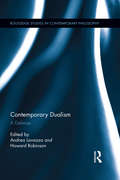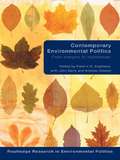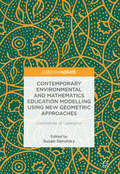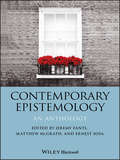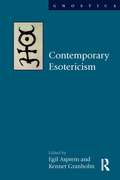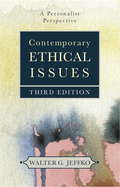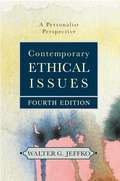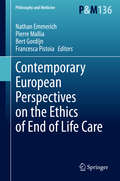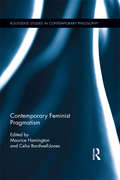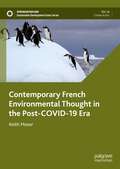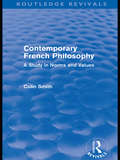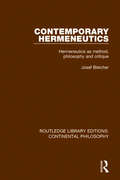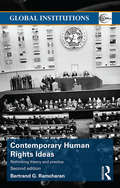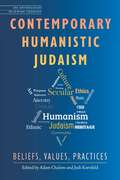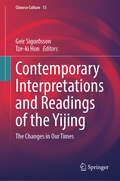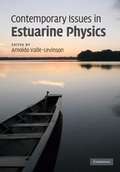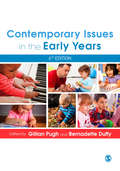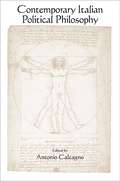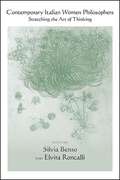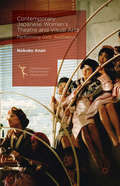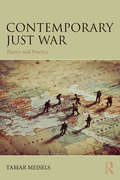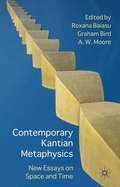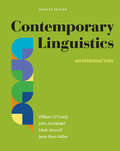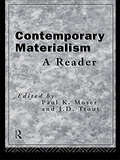- Table View
- List View
Contemporary Dualism: A Defense (Routledge Studies in Contemporary Philosophy)
by Howard Robinson Andrea LavazzaOntological materialism, in its various forms, has become the orthodox view in contemporary philosophy of mind. This book provides a variety of defenses of mind-body dualism, and shows (explicitly or implicitly) that a thoroughgoing ontological materialism cannot be sustained. The contributions are intended to show that, at the very least, ontological dualism (as contrasted with a dualism that is merely linguistic or epistemic) constitutes a philosophically respectable alternative to the monistic views that currently dominate thought about the mind-body (or, perhaps more appropriately, person-body) relation.
Contemporary Dualism: A Defense (Routledge Studies in Contemporary Philosophy)
by Howard Robinson Andrea LavazzaOntological materialism, in its various forms, has become the orthodox view in contemporary philosophy of mind. This book provides a variety of defenses of mind-body dualism, and shows (explicitly or implicitly) that a thoroughgoing ontological materialism cannot be sustained. The contributions are intended to show that, at the very least, ontological dualism (as contrasted with a dualism that is merely linguistic or epistemic) constitutes a philosophically respectable alternative to the monistic views that currently dominate thought about the mind-body (or, perhaps more appropriately, person-body) relation.
Contemporary Environmental Politics: From Margins to Mainstream (Environmental Politics #Vol. 12)
by Andrew Dobson John Barry Piers H.G. StephensThis new collection from the leading journal, Environmental Politics, presents an excellent overview of the key themes found in contemporary green political thought since the early 1990s. Bringing together the journal's major work, this new book charts a fascinating period in which environmental politics developed from a marginal position in society and the academy, to its current place in the intellectual mainstream. Subdivided into clear sections on political theory, social movements, political economy and policy questions, and assisted by a contextualising introduction, this volume focuses on a set of clear themes: the character of green political theory relationships with other political traditions and theories origins and dynamics of contemporary environmental politics differences, similarities and tensions between the North and South the relationship of environmentalism to market economics and ecological modernization environmental aspects of distributive justice at the local, national and global levels the roles, value and valuing of nature in green theory and institutional practice. As a compilation, this book is unique. It delivers a snapshot of a variety of issues in the field, and is therefore ideally suited to teaching purposes, especially at postgraduate level. In addition, as each section is chronologically arranged, an evolution of related ideas can be clearly seen and appreciated, which builds an excellent understanding of the field of environmental politics
Contemporary Environmental and Mathematics Education Modelling Using New Geometric Approaches: Geometries of Liberation
by Susan GerofskyThis book takes a fresh approach to using educational tools to solve profound problems in societies. The authors bring perspectives from curriculum studies, mathematics education, environmental education, and Indigenous epistemologies to a new consideration of “geometries to think with”. These tools reveal the wealth of resources and interrelationships in our world that have the potential to reconfigure and revitalize education. The transdisciplinary nature of the chapters and authors emphasizes the need for thinking beyond boundaries, while respecting the wisdom inherent in intellectual disciplines and traditions.
Contemporary Epistemology: An Anthology (Blackwell Philosophy Anthologies)
by Ernest Sosa Jeremy Fantl Matthew McGrathA rigorous, authoritative new anthology which brings together some of the most significant contemporary scholarship on the theory of knowledge Carefully-calibrated and judiciously-curated, this strong and contemporary new anthology builds upon Epistemology: An Anthology, Second Edition (Wiley Blackwell, 2008) by drawing a concise and well-balanced selection of higher-level readings from a large, diverse, and evolving body of research. Includes 17 readings that represent a broad and vital part of contemporary epistemology, including articles by female philosophers and emerging thought leaders Organized into seven thoughtful and distinct sections, including virtue epistemology, practical reasons for belief, and epistemic dysfunctions among others Designed to sit alongside the highly-successful anthology of canonical essays, Epistemology: An Anthology, Second Edition (Wiley Blackwell, 2008) Edited by a distinguished editorial team, including Ernie Sosa, one of the most influential active epistemologists Highlights cutting edge methodologies and contemporary topics for advanced students, instructors, and researchers
Contemporary Esotericism: Contemporary Esotericism (Gnostica Ser.)
by Kennet Granholm Egil AspremThe study of contemporary esoteric discourse has hitherto been a largely neglected part of the new academic field of Western esotericism. Contemporary Esotericism provides a broad overview and assessment of the complex world of Western esoteric thought today. Combining historiographical analysis with theories and methodologies from the social sciences, the volume explores new problems and offers new possibilities for the study of esoterica. Contemporary Esotericism studies the period since the 1950s but focuses on the last two decades. The wide range of essays are divided into four thematic sections: the intricacies of esoteric appeals to tradition; the role of popular culture, modern communication technologies, and new media in contemporary esotericism; the impact and influence of esotericism on both religious and secular arenas; and the recent 'de-marginalization' of the esoteric in both scholarship and society.
Contemporary Ethical Issues: A Personalist Perspective (3rd Edition)
by Walter G. JeffkoNow in a newly revised third edition, this explores a series of compelling moral problems from a personalist perspective influenced by the Scottish philosopher John Macmurray (1891-1976). In many publications spanning fifty years, most notably his Gifford Lectures titled "The Form of the Personal," Macmurray developed a robust personalism that emphasizes the primacy of persons as rational agents. In hisview, self-realization is achieved in community where justice and individual rights are respected. From the background of a liberal Roman Catholic, Walter G. Jeffko utilizes key elements of Macmurray's thought in developing his own philosophical viewpoint, and he relates Macmurray's ideas to those of a wide variety of important philosophers, ethicists, and other notable thinkers, including ecologists and war theorists. New to this third edition is an essay on the moral treatment of civilians in war, including a rigorous critique of Michael Walzer's "supreme emergency" and the communitarianism that grounds it. Many recent Supreme Court decisions are evaluated, as is the threat to our democracy posed by unlimited sums of money in politics, the growing inequality of wealth and income, and the rise of political extremism on the right and its threat to women's rights. Jeffko brings logical precision and a lucid style to the study of ethics, blending powerful scholarship with readability.
Contemporary Ethical Issues: A Personalist Perspective (Fourth Edition)
by Walter G. JeffkoPhilosophy professor Walter G Jeffko explores a series of contemporary ethical problems from a personalistic perspective influenced by the Scottish philosopher John Macmurray (1891-1976). Professor Jeffko utilizes key elements of Macmurray's thought in developing his own viewpoint; and he relates Macmurray's ideas to those of a wide variety of important philosophers, ethicists, and behavioral scientists. In the opening chapter Jeffko develops a personalistic anthropological and ethical theory within a framework that views the person a relational and rational agent, reason as the standard of value, and the principle of community as the supreme ethical standard.In successive chapters, this theory is applied to the issues of suicide, abortion, euthanasia (including assisted suicide), the death penalty, privacy (including private property and capitalism), the moral treatment of animals, and affirmative action. Jeffko connects ethics with logic in a lucid style that blends scholarship with readability. This is a fresh and absorbing examination of the key ethical dilemmas of our time.
Contemporary European Perspectives on the Ethics of End of Life Care (Philosophy and Medicine #136)
by Bert Gordijn Nathan Emmerich Pierre Mallia Francesca PistoiaThis book examines the ethics of end of life care, focusing on the kinds of decisions that are commonly made in clinical practice. Specific attention is paid to the intensification of treatment for terminal symptoms, particularly pain relief, and the withdrawal and withholding of care, particularly life-saving or life-prolonging medical care. The book is structured into three sections. The first section contains essays examining end of life care from the perspective of moral theory and theology. The second sets out various conceptual terms and distinctions relevant to decision-making at the end of life. The third section contains chapters that focus on substantive ethical issues. This format not only provides for a comprehensive analysis of the ethical issues that arise in the context of end of life care but allows readers to effectively trace the philosophical, theological and conceptual underpinnings that inform their specific interests. This work will be of interest to scholars working in the area as well as clinicians, specialists and healthcare professionals who encounter these issues in the course of their practice.
Contemporary Feminist Pragmatism (Routledge Studies in Contemporary Philosophy)
by Maurice Hamington and Celia Bardwell-JonesThe notion of "feminist pragmatism" or "pragmatist feminism" has been around since Charlene Haddock Seigfried introduced it two decades ago. However, the bulk of the work in this field has been directed toward recovering the feminist strain of classical American philosophy, largely through renewed interest in the work of Jane Addams. This exploration of the origins of feminism and pragmatism has been fruitful in building a foundation for theoretical considerations. The editors of this volume believe the next logical step is the contemporary application to both theory and experience. Contemporary Feminist Pragmatism is the first book to address the modern significance of the nexus of feminism and pragmatism. The issues explored here include the relationship between community and identity, particularly around the impact of gender and race; reframing political practice regarding feminist pragmatist commitments including education, sustainability movements, and local efforts like community gardens; and the association between ethics and inquiry including explorations of Buddhism, hospitality, and animal-human relationships.
Contemporary French Environmental Thought in the Post-COVID-19 Era (Sustainable Development Goals Series)
by Keith MoserContemporary French Environmental Thought in the Post-COVID-19 Era is focused on the fields of biosemiotics, linguistics, ecocriticism, and environmental ethics. Closely aligning with Sustainable Development Goal 13.1, Keith Moser’s study aims to strengthen resilience to climate-related hazards by drawing on ecological theories developed by French philosophers in conversation with biosemiotic principles. Not only does the novel theoretical framework offered by biosemiotic interpretations of the universe and our place in it represent an indispensable conceptual tool for understanding the unprecedented medical challenges at the dawn of a new millennium, but it also beckons us to think harder about the environmental crisis that threatens the continued existence of all sentient beings who call the biosphere home. This book also highlights the richness, diversity, and utility of the ecological theories developed by the French philosophers Michel Serres, Edgar Morin, Jacques Derrida, Dominique Lestel, and Michel Onfray in addition to how they engage with biosemiotic principles. Taken together, the book probes the scientific, linguistic, philosophical, and ethical implications of biosemiotic theories in a post-pandemic world from an environmental and medical perspective.
Contemporary French Philosophy: A Study in Norms and Values (Routledge Revivals)
by Colin SmithFirst published in 1964, this is not just a chronicle or encyclopaedia, but deals thoroughly in turn with meaning, view about reason, and views about values, particularly moral values. The author's knowledge of French literature is extensive and thorough, and a feature of the book is his analysis of the philosophical implications of literary works by Sartre, Paul Valery, Camus and others.
Contemporary Hermeneutics: Hermeneutics as Method, Philosophy and Critique (Routledge Library Editions: Continental Philosophy #2)
by Josef BleicherHermeneutics can loosely be defined as the theory or philosophy of the interpretation of menaing. It is a central topic in the philosophy of the social sciences, the philosophy of art and language and in literary criticism. This book, first published in 1980, gives a detailed overview and analysis of the main strands of contemporary hermeneutical thought. It includes a number of readings in order to give the reader a first-hand acquaintance with the subjects and the debates within it.
Contemporary Human Rights Ideas: Rethinking theory and practice (Global Institutions)
by Bertrand G. RamcharanWritten by a former UN High Commissioner for Human Rights (2003–4), this book has been fully updated for a second edition and continues to provide a much needed, short and accessible introduction to the foundational human rights ideas of our times and shows that every government is under international obligation to respect and uphold universal human rights. Updates include: Discussion of the recent intellectual challenges to the international human rights movement Examination of the establishment and functioning of the Human Rights Council and the Universal Review Process Evaluation of the developments in the area of the Responsibility to Protect and continued efforts to implement the right to development Inclusion of issues such as the push for compensation for slavery, experiments with democracy in a number of countries and the decisions of international judicial and human rights organs on conceptual and protection issues This book will be of great interest to students and scholars of Global Institutions, International Law and Human Rights.
Contemporary Humanistic Judaism: Beliefs, Values, Practices (JPS Anthologies of Jewish Thought)
by Adam Chalom Jodi KornfeldOpening up multidimensional ideas, values, and practices of Humanistic Judaism to Jews of all backgrounds and beliefs, Contemporary Humanistic Judaism collects the movement&’s most important texts for the first time and answers the oft-raised question, &“How can you be Jewish and celebrate Judaism if you don&’t believe in God?&” with new vision. Part 1 (&“Beliefs and Ethics&”) examines core positive beliefs—in human agency, social progress, ethics without supernatural authority, sources of natural transcendence, and Humanistic Jews&’ own authority to remake their traditional Jewish inheritance on their own terms &“beyond God.&” Part 2 (&“Identity&”) discusses how Humanistic Judaism empowers individuals to self-define as Jews, respects people&’s decisions to marry whom they love, and navigates the Israel-Diaspora relationship. Part 3 (&“Culture&”) describes how the many worlds of Jewish cultural experience—art, music, food, language, heirlooms—ground Jewishness and enable endless exploration. Part 4 (&“Jewish Life&”) applies humanist philosophy to lived Jewish experience: reimagined creative education (where students choose passages meaningful to them for their bar, bat, or b mitzvah [gender-neutral] celebrations), liturgy, life cycle, and holiday celebrations (where Hanukkah emphasizes the religious freedom to believe as one chooses). Jewish seekers, educators, and scholars alike will come to appreciate the unique ideologies and lived expressions of Humanistic Judaism.
Contemporary Interpretations and Readings of the Yijing: The Changes in Our Times (Chinese Culture #15)
by Tze-Ki Hon Geir SigurðssonThis book questions whether the ancient, iconic Chinese book of divination, The Classic of Changes (Yijing) might help us navigate the precarious, complex, and seemingly unpredictable intricacies of present contemporary times. The essays contained in this book respond affirmatively to this question in seeking to show how The Classic of Changes can help us think through the particularly human challenge of establishing meaning and making choices between alternatives. The author&’s book explores and discusses novel and often surprising ways for contemporary readers to interpret and apply this ancient Chinese classic, touching upon fields such as narration, technology, ecology, psychology, aesthetics, ontology, cognition, semiotics, and gender issues. This book is of appeal to both students and informed readers with an interest in the mysteries of The Classic of Changes, and to researchers in areas of Chinese philosophy, Chinese history, religious studies, and East Asian approaches to health and well-being.
Contemporary Issues in Estuarine Physics
by A. Valle-LevinsonEstuaries are of high socioeconomic importance with 22 of the 32 largest cities in the world located on river estuaries. Estuaries bring together fluxes of fresh and saline water, as well as fluvial and marine sediments, and contain high biological diversity. Increasingly sophisticated field observation technology and numerical modeling have produced significant advances in our understanding of the physical properties of estuaries over the last decade. This book introduces a classification for estuaries before presenting the basic physics and hydrodynamics of estuarine circulation and the various factors that modify it in time and space. It then covers special topics at the forefront of research such as turbulence, fronts in estuaries and continental shelves, low inflow estuaries, and implications of estuarine transport for water quality. Written by leading authorities on estuarine and lagoon hydrodynamics, this volume provides a concise foundation for academic researchers, advanced students and coastal resource managers.
Contemporary Issues in the Early Years: Working Collaboratively For Children
by Dame Gillian Pugh Bernadette DuffyIf you are a student or practitioner in the early years sector, you need to develop a rounded understanding of key issues in this fast-moving field. This new and updated edition provides a critical examination of the essential issues in early years policy and practice. With contributions from highly regarded practitioners and researchers, this book accessibly balances theory and practical concerns. The Sixth Edition has been extensively revised to include: A new chapter on Child Protection and Safeguarding Coverage of the new EYFS Theory and research evidence A Companion Website, highlighting further reading and current policies and frameworks. You can visit the Companion Website at www.uk.sagepub.com/pughduffy to view a video from the authors, and also access study materials including: Points for discussion Reflective tasks Further reading Web links.
Contemporary Italian Political Philosophy (SUNY series in Contemporary Italian Philosophy)
by Antonio CalcagnoItaly has a rich philosophical legacy, and recent developments and movements in its political philosophy have produced a significant body of thought by internationally renowned philosophers working on questions and themes such as the critique of neoliberalism, statehood, politics and culture, feminism, community, the stranger, and the relationship between politics and action. This volume brings this conversation to English-language readers, considering well-known Italian philosophers such as Vattimo, Agamben, Esposito, and Negri, as well as philosophers with whom English-language readers are less acquainted, such as Luce Fabbri, Adriana Cavarero, and Lea Melandri. In addition, the essays extend the conversation beyond the realm of Italian philosophy, bringing its thinkers into dialogue with philosophical figures including Badiou, Marx, Merleau-Ponty, Deleuze and Guattari, Adorno, Arendt, Foucault, Wittgenstein, and the Peruvian historian and sociologist Anibal Quijano.
Contemporary Italian Women Philosophers: Stretching the Art of Thinking (SUNY series in Contemporary Italian Philosophy)
by Silvia Benso; Elvira RoncalliGathering the contributions of eleven contemporary Italian women thinkers who share a philosophical practice, Contemporary Italian Women Philosophers embraces a general interrelationality, fluidity, and overlapping of concepts for a border-crossing that affects what it means to be subjects that are embodied and participants in the life of their communities, thereby shaping a sense of belonging. Common threads are revealed through the exploration of radically diverse themes (the body, subjectivity, power, freedom, equality, liberation, the emotions, symbolism and metaphors, maternity, reproduction, responsibility, the political, the economic) and approaches (autobiographical styles, personal narratives, rootedness in the everyday, advancement of relationality, empathic responsibility, passions, and commitment to the flourishing of the polis). In their differences, these previously unpublished essays give the reader a glimpse of the fecund and articulated philosophical work of women in the Italian context—a context which has not been and still is not always benign toward women's distinctive originality and creativity.
Contemporary Japanese Women’s Theatre and Visual Arts: Performing Girls’ Aesthetics (Contemporary Performance InterActions)
by Nobuko AnanThis book traces the history of 'girls' aesthetics,' where adult Japanese women create art works about 'girls' that resist motherhood, from the modern to the contemporary period and their manifestation in Japanese women's theatrical and dance performance and visual arts including manga, film, and installation arts.
Contemporary Just War: Theory and Practice (War, Conflict and Ethics)
by Tamar MeiselsThis book offers a renewed defense of traditional just war theory and considers its application to certain contemporary cases, particularly in the Middle East. The first part of the book addresses and responds to the central theoretical criticisms levelled at traditional just war theory. It offers a detailed defense of civilian immunity, the moral equality of soldiers and the related dichotomy between jus ad bellum and jus in bello, and argues that these principles taken together amount to a morally coherent ethics of war. In this sense this project is traditional (or "orthodox"). In another sense, however, it is highly relevant to the modern world. While the first part of the book defends the just war tradition against its revisionist critics, the second part applies it to an array of timely issues: civil war, economic warfare, excessive harm to civilians, pre-emptive military strikes, and state-sponsored assassination, which require applying just war theory in practice. This book sets out to reaffirm the basic tenets of the traditional ethics of war and to lend them further moral support, subsequently applying them to a variety of practical issues. This book will be of great interest to students of just war theory, ethics, security studies, war and conflict studies, and IR in general.
Contemporary Kantian Metaphysics
by A. W. Moore Graham Bird Roxana BaiasuThis collectionresponds to two needs in the literature. First, the Kantian tradition of thought about space and time represents a rich philosophical resource, insufficiently explored in Anglo-American philosophy. The volume explores this resource. More precisely, it questions a basic assumption of a powerful trend in contemporary metaphysics: the assumption that reality is spatio-temporally organised independently of us. Kant's revolutionary contribution to metaphysics was likewise to question this assumption. The volume draws attention to Kant's distinctive approach to metaphysics and breaks new ground by radically broadening the scope of recent discussions on space and time, in particular by examining certain connections which metaphysics and science have to epistemic agency. Second, contemporary Kantian philosophy is currently pursued along two lines of thinking developed in Anglo-American literature and European philosophy. This work brings their distinct claims into a productive dialogue on topical issues such as action, perception, the body, and cognition and its limits.
Contemporary Linguistics Seventh Edition
by Mark Aronoff John Archibald Janie Rees-Miller William O’gradyContemporary Linguistics is one of the most comprehensive introduction to the fundamentals of linguistics, balancing engaging aspects of language study with solid coverage of the basics. Up-to-date scholarship, a direct approach, and a lucid writing style makes it appealing to instructors and beginning students alike and a resource that many students continue to use beyond the classroom.
Contemporary Materialism: A Reader
by Paul K. Moser J. D. TroutContemporary Materialism brings together the best recent work on materialism from many of our leading contemporary philosophers. This is the first comprehensive reader on the subject. The majority of philosophers and scientists today hold the view that all phenomena are physical, as a result materialism or 'physicalism' is now the dominant ontology in a wide range of fields. Surprisingly no single book, until now, has collected the key investigations into materialism, to reflect the impact it has had on current thinking in metaphysics, philosophy of mind and the theory of value. The classic papers in this collection chart contemporary problems, positions and themes in materialism. At the invitation of the editors, many of the papers have been specially up-dated for this collection: follow-on pieces written by the contributors enable them to appraise the original paper and assess developments since the work was first published. The book's selections are largely non-technical and accessible to advanced undergraduates. The editors have provided a useful general introduction, outlining and contextualising this central system of thought, as well as a topical bibliography. Contemporary Materialism will be vital reading for anyone concerned to discover the ideas underlying contemporary philosophy. David Armstrong, University of Sydney; Jerry Fodor, Rutgers University, New Jersey; Tim Crane, University College, London; D. H. Mellor, Univeristy of Cambridge; J.J.C.
